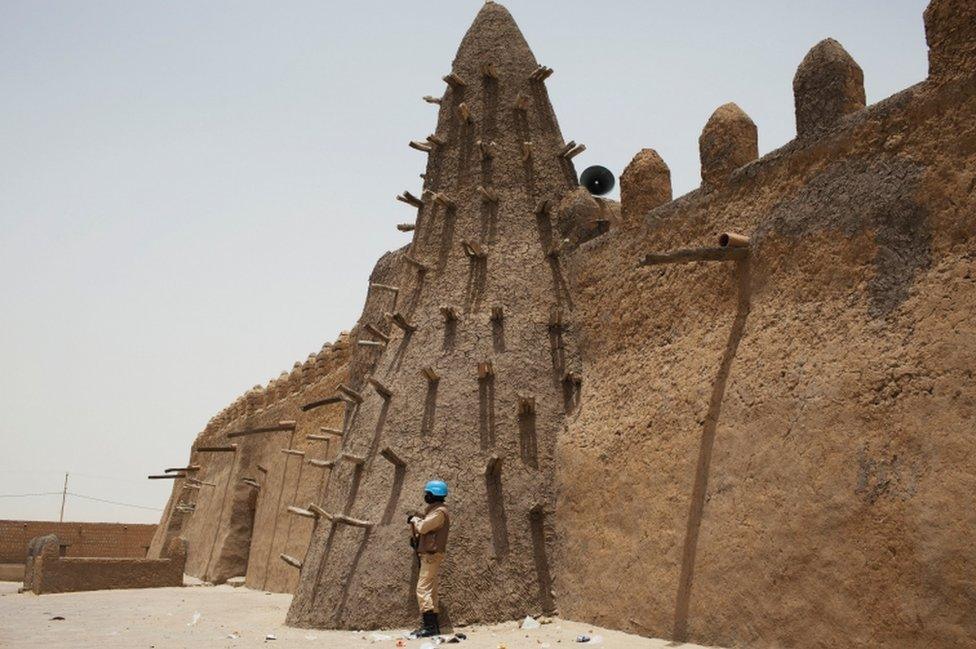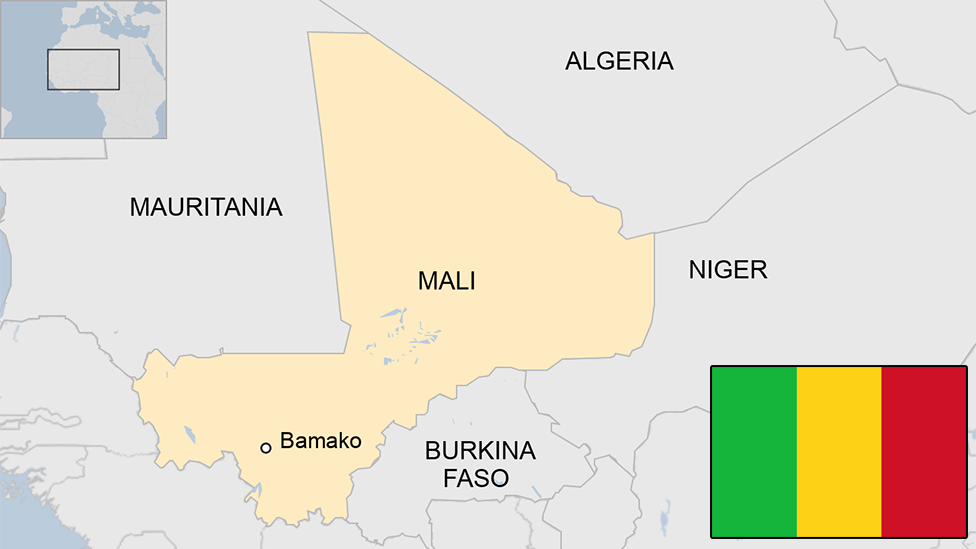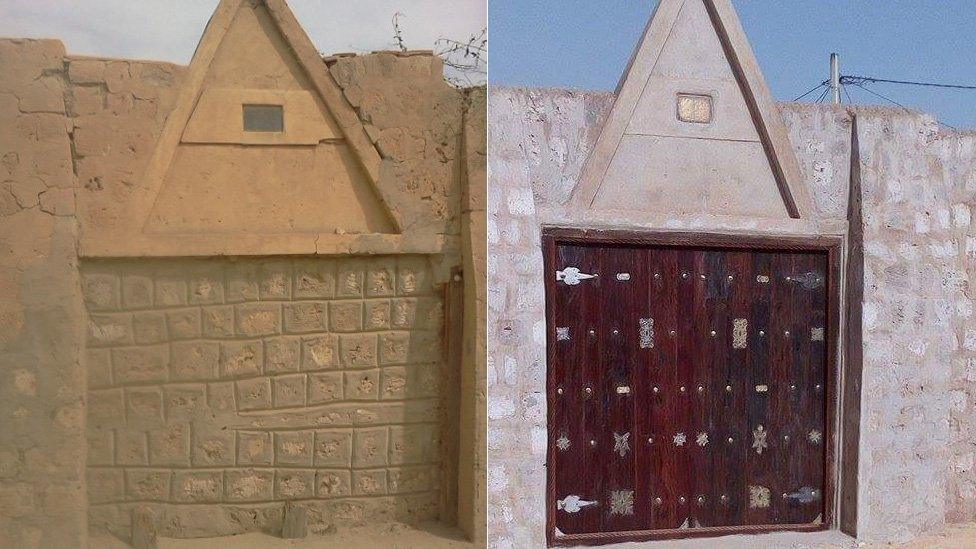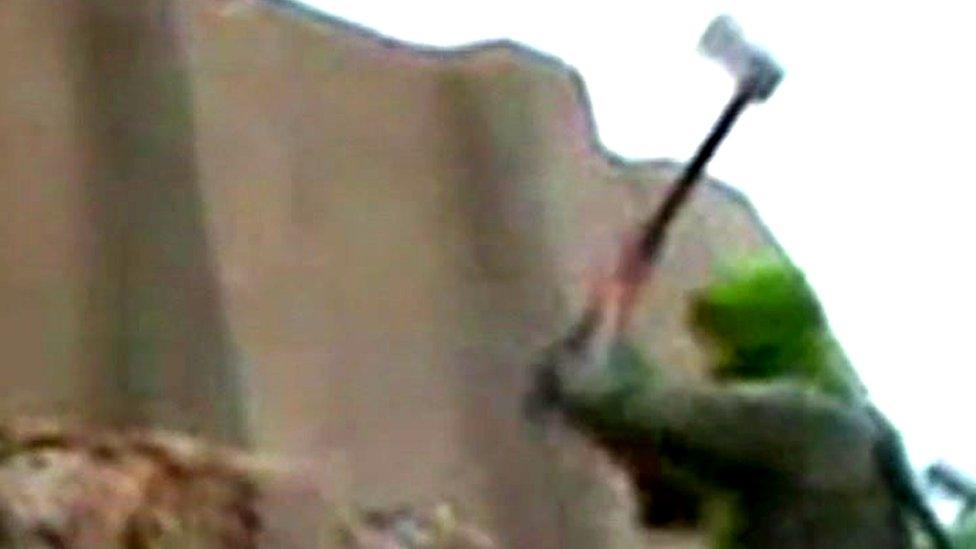Timbuktu's jihadist police chief before ICC for war crimes in Mali
- Published

The former police chief was handed over to the ICC by Mali's authorities in 2018
The ex-head of the Islamic police in Timbuktu was part of a "reign of terror" in the Malian city in 2012, prosecutors in The Hague say.
Al Hassan Ag Abdoul Aziz Ag Mohamed Ag Mahmoude's lawyers argued he was not mentally fit to stand trial at the International Criminal Court (ICC) where he refused to enter a plea.
He was a member of an Islamist militant group that imposed strict Islamic law.
Charges against him include torture and sexual slavery.
He is also charged with directing attacks against historic monuments, including ancient manuscripts and buildings dedicated to Islam, which the militants considered idolatrous.
Mr Al Hassan was handed over to the ICC in 2018 by the Malian authorities - five years after French troops helped liberate Timbuktu from the jihadists.
'Gloveless women were lashed'
He is accused of being a key member of Ansar Dine, the militants who occupied Timbuktu in May 2012 - one of several Islamist groups to exploit an ethnic Tuareg uprising at the time to take over cities in northern Mali.

Tombs at the Djingareyber mosque in Timbuktu were smashed by Islamist militants in 2012
Mr Al Hassan, wearing a long kaftan, a white turban and a face mask, stood to listen to the 13 charges read out against him on the first day of his trial.
When asked if he would enter a plea, to all 13 counts he replied: "I cannot answer this question."
He is accused of being a key member of Ansar Dine, the militants who occupied Timbuktu in May 2012 - one of several Islamist groups to exploit an ethnic Tuareg uprising at the time to take over cities in northern Mali.
ICC prosecutor Fatou Bensouda told the court that Ansar Dine's control and domination of the city "was total".

Several jihadist groups, including these militants from Ansar Dine, overran northern Mali in 2012
She described Timbuktu under their rule as a place where "everything was forbidden" - including dancing, make-up and jewellery for women and long trousers for men.
Women could be punished with lashings on the spot for breaking rules such as not wearing gloves at the market, she said.
She said that Mr Al Hassan had played a central role in the Islamic police who carried out punishments and told the story of a man who had his hand amputated after he was accused of petty theft.
He is also accused of involvement in forcing girls and women to marry militants.
Many Muslim shrines were also destroyed during Ansar Dine's rule, which lasted until January 2013 when 4,000 French troops were deployed to help Mali's army fight back against the militants who were pushing south.
Timbuktu is famous for its distinctive mud and wood architecture. It was a centre of Islamic learning between the 13th and 17th centuries and was added to the Unesco world heritage list in 1988.

You may also be interested to watch:
A Benedictine monk has travelled to Timbuktu to save Islamic texts

But Islamists regard the shrines and the city's ancient manuscripts, covering everything from history to astronomy, as idolatrous.
However, some Muslims, especially Sufis, regard them as an accepted part of Muslim worship.
Mr Al Hassan is only the second person to face trial at the court over his actions during the devastating war in Mali.
The other man, Ahmad al-Faqi al-Mahdi pleaded guilty in 2016 to destroying nine mausoleums and a mosque, in the first case of cultural desecration heard by the ICC.
He was jailed for nine years, after declaring he was "really sorry" for his actions and asking for forgiveness.
In 2017 ICC judges found him liable for nearly €3m (£2.6m; $3,6m) in damages.
- Published28 July 2023

- Published27 September 2016

- Published30 September 2015
